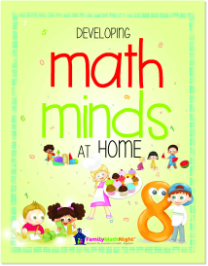Developing Math Minds at Home Parent Guide

I’m happy to announce that our parent guide Developing Math Minds at Home is now complete.
The guide was designed to help families support math learning at home. As parents work on reinforcing math skills, it’s also important that we show them how to help their children develop a strong math mind. As we describe in the guide, “Children with a strong math mind are comfortable using math. They understand that math is a useful part of our everyday lives and are confident using it to solve problems.”
The guide underscores what the current research says about how children learn math and includes topics such as:
- Fostering a Growth Mindset
- Supporting a Positive Attitude Towards Mathematics
- Promoting Critical Thinking and Problem-Solving Skills
- Developing Number Sense
- Solving Problems a Variety of Ways
- Embracing Mistakes
- Encouraging Positive Self-Talk
We also have a Spanish version of the booklet. For a sample page, check out our website.
